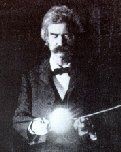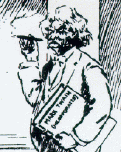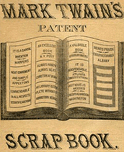


|
Facts, By a Woman is the promising title of an anonymously published account of being a subscription book seller in California in the 1870s. The "Woman" was really Harriet Wasson, who was born in 1842 in Wooster, Ohio. By "Facts" she means the antidote to innuendo. The occasion for her book is defined at the start by the remark of a woman, made to other women, about a woman book agent she has just turned away from her door: "I cannot, for the life of me, see how any woman that has the least sort of respect for herself can engage in such an occupation. Why the very idea is enough to repel a pure-minded person." Before becoming a book agent, Wasson notes she tried unsuccessfully to support herself selling something called "plaiting machines" house-to-house; apparently that was more reputable because her customers would have been women, whereas selling books regularly brought her into contact with men customers. Although her account shows that even buyers of a book like Tom Sawyer sometimes had ulterior, adult motives for dealing with her, she ends Facts with a declaration of her profession's respectability: "I solicited from basements to garrets, and sold books in both, to rich and poor men, roughs and gentlemen; and think I have climbed steps enough to land me in heavenland, and am just as far away from the goodly place, but not any farther, than when I first began my sad departure; for I received many good lessons, and some of the very best, from the roughest masters, and when least expected. And although temptations and insults greeted me, I would also have received them if stationed behind any village or city store counter, in any permanent establishment. And I saw no reason why I should not or could not work in that capacity as well as men, and support myself, and respectably, too. " The first book she ever peddled door-to-door was Tom Sawyer. The following excerpt from her account of that experience is a bit breathlessly written, but it also provides good firsthand evidence about the subscription system. It indicates the kinds of things that counted with MT's subscription audience, and how MT's first novel was received in a small California mining town called Oroville -- another promising title. |
|
Debating the question of ways and means, . . . I was prompted instinctively to pick up a city newspaper . . . my visionary mind was mechanically drawn down through its newsy page to a single item of distinctive meaning, so electrifying and magically warming my freezing life-current, that I was instantly thrown into complete respiration and retroaction. It was a simple announcement, an advertisement only, of A. Roman & Co., who wanted agents to canvass "Tom Sawyer," Mark Twain's new book. I had been led to it by a mysterious guidance . . . . I seized my writing material immediately and wrote to the firm, asking for the prospectus book, and the town of Oroville as territory to work upon. . . . Night came again, and with it the evening stage, bearing that haven of hope, the mail bag, which brought me a prospectus book and a letter of instructions from A. Roman & Co. They gave me Oroville, as I had so desired, and fortune, ever treacherous, smiled upon me again. All my sweet-scented nightshades of the evening before were at a great discount. I extended the illuminating facility of my chamber to its fullest capacity, and with book in hand I longed for more light, while I waltzed off into a happy maze, under the influence of the tuneful liar, "Mark Twain" . . . My prospectus book proved very disconnected reading, but I found matter sufficiently interesting to keep me engaged long enough to consume my allowance of candlelight . . . Monday morning came, with a hard rain, which kept me at home all day. I was glad, indeed, that it did rain, as it gave me time to prepare myself for that demoralizing field I was about to enter. Tuesday dawned clearly and bright, and after paying extra attention to my toilet, I began, with far greater agitation, to canvass the town again [i.e. after trying to sell her plaiting machine]. As my machines simply showed their own desirable qualities to ladies that wanted to buy, it was easy work to sell them; but the books, and to gentlemen, required a different tale; and I was ignorant enough of both to make anybody happy. I had examined my prospectus sufficiently to know that it was a book intended for youthful minds, and all in reading-life, clean through to the oldest age, and I felt capable to give it a passable showing. . . . In accordance with the . . . instructions . . . of my guiding pamphlet, which I had received in connection with my evil outfit from the city furnishing establishment, I began my corruptive employment among the officials and leading men of business, going to the Court House first, for influential names. . . . As I stood there, staring in simplest attitudes of simplest country breeding, and fresh, too, apparently, from a genuine farm, while pliantly bending with the breathing atmosphere of those tremendous city bodies that I had dared to face. I leaned over to the nearest one to me, and tried to tell him my business in town; he seemed to understand me, and wrote me his name on the order page. He was one of the county officers, I have forgotten which, but his name was Armstrong. An appropriate name, I thought, for with a strong arm he dashed down an order for a book that would give the most money, one in morocco binding. Seeing that I bowed to him first, he said, in passing the prospectus back to me: "There, I have given you a good send-off." I appreciated his kindness more than he was aware of. The two expectant dollars I would get for my commission on that finely-bound book lent a charm, and helped me complete my call in that dreaded house of law without any more fear, which left me through kindly treatment. I received five subscribers, and went home to dinner feeling more happy than otherwise. After noon I tried again in private offices, getting in all eleven subscribers, which was good wages and not hard work for a new beginner. I had been treated by all with sincere respect, meeting with nothing unpleasant, as expected insults, or I was happily too ignorant to observe any if offered. And I retired at night feeling more at peace with mankind generally than I anticipated, and I slept sweetly. The next day I started out with an average amount of assurance, and went boldly into the first business place, after leaving the hotel. I worked along till noontime, receiving an order in one place, none perhaps in the next; promises, too, by the wary men who were sensitive about being caught outright without plenty of company, and would request me to call again, at a later day; and I did not disappoint them by a second visit, though chagrined myself in doing so. After dinner I went out especially to find "George C. Perkins," as nearly everybody told me to go to him, they knew he would subscribe for a book. . . I addressed myself to him, begging to be excused for interrupting the conversation, told him that I was soliciting orders for "Mark Twain's" new book, and I should be pleased to add his name to my list of subscribers. The gallant "George" took my book, while a thrill of pleasure crept over me as he gracefully turned the leaves, but, only to creep back again, with a changed feeling; another thrill of disappointment as he gently closed my prospectus and tenderly passed it back to me, assuring me as he did so, that he would gladly give me his name, were he not already the happy possessor of one. Too late again, I sighed; but he spoke favorably of the book, and was doubtless the means of getting me other subscribers, which was the next best thing he could do for me . . . Our Governor, being ahead then as now, had purchased "Tom Sawyer" some weeks before, from Roman & Co., in San Francisco . . . Saturday concluded my order taking, with a pleasing incident that often comes back to me in my day visions. I had canvassed all places except a few scattering houses that were located on a street leading out from the town through some old gold mines. Yes, it was old gold, still alive and fashionable, but alas, buried. I was walking along, looking over the sad scene and deeply regretting that anything so ornamental and very necessary as that precious metal should be covered away in that cold, ugly ground. I paused mournfully, when a little boy came running up to me saying:-- "Say, say, will yer lem'me see yer book?" "Certainly," I replied, turning to a picture as I handed it to him. "Oh, that's Tom! Isn't it?" And he looked with delight, talking on, "I've been wantin' dad to buy me one, and he said he would if he had more money than he knowed what do do with. That don't look much like gettin it though, does it? Some boys told me about 'Tom Sawyer' -- said he and some other fellers went to their own funerals; gol! musn't that a been fun? . . ." It was Saturday night. I sent an order to the city for books, and concluded to go to the town of Cherokee Flat and canvass that place while waiting for my books . . . I found my books, fifty-seven in number, awaiting me for delivery. . . . I rested until Monday, and read for the first time the book I had been soliciting orders for; I was so disappointed in the size of the complete work that it afforded me anything but the pleasure I had anticipated through my perusal. The tantalizing gaps of the prospectus were connected only by a very short literary thread, and I was attacked by a thousand fears. I had been representing it, as the Nevada Indian says: "A heap great big large" book and I felt that the whole bottom had dropped right out of my pan, and lost all my gold right there in the very place where I was digging for it . . . I thought the people would not take the books as I had lied so about them, and I would be out in the cold completely, with no money, and nothing but a deceptive lot of, to me, worthless books. I found that soliciting names and delivering were two separate and distinct occupations. I was always happy when receiving my orders, for my business in that form was then complete; but, in delivering my books, I must call for money; and could I always get it? A ghostly admonition answered emphatically, No! Monday morning I appeared before that public again with a weaker heart then ever before. My books had been consigned to a merchant, and I went to him with tottering footsteps. As I was paying him for a few that I intended to carry out, that Jewish proprietor remarked to me: "Dem pooks ish tam shmall!" "Yes," I said, "but they are good, though." I did not say "tam," but I thought it. I gathered them under my wings, as any hen might do, for they were little enough, being fresh hatched to me, and started out with my brood. I expected to be destroyed completely by those dangerous hawks, my subscribers, while protecting my young with a tremulous flutter, as I crossed the street, aiming for rest and shelter in the safe beyond. The bank was open. I deposited my chicks on the counter, in plain view of those whom I felt were obliged to relieve me; and shades of disappointment swept over the brow of each one as they gauged the dimensions of the group I brought them. They received them though, and paid me, owing probably to their being early Spring, and a dainty lot. I was delivered from my torturing pack most joyfully, and went back to the nest for another supply. I lost no time in getting through with that uncertain delivery work; in two days of constant flitting back and forth before the awful footlights, the curtain went down over my third and last act in Oroville; and I could truthfully say that I was as much displeased with the closing scene as any of my patronizing observers; for there was nothing at all agreeable to me except the money I received, which seemed little enough considering my worriment. Everybody was disappointed by the smallness of their books; but they all took them except one lady. The merchant told me that she was perfectly good, and feeling so sure of her taking the book, as she had expressed herself particularly anxious to get one, I deferred going to her until I was through with other subscribers more doubtful. My newly born had been gaining in strength, and I had ceased to think or worry about its youthful appearance. When I tried to present that goodly woman with her long-looked-for child, "Tom Sawyer," which she measured by a glance and absolutely refused to foster, I told her that she must take it, as I had ordered it expressly for her by her own desire. "Well," she said, "I have not got the money now, but if you will come this afternoon I will receive the book and pay you for it." I called as requested; she was not at home; and she kept playing "not at home" till I beat her at that game with my persistence, when she changed the programme by opening the door just wide enough to tell me: "I will not take the book, and you need not come here again!" I felt more angry than surprised at her treatment. She was a devout member of the leading Christian Church, and I had seen a few of those purely good women before, like her, always so good -- to themselves. . . . . . . As I was going up the hotel steps en route to my room, I passed a gentleman, one of my subscribers, who had received and paid me for his book, and I was perfectly willing to let him pass me on the stairs, or any place else, as I had my money. Finding my room rather close, as it was a warm day, I threw open the window, by which I sat down to cool my throbbing brow . . . I was looking off over the town into Feather River, and thinking what a beautiful stream it would be were its rapidly flowing waters free from the mud and mining debris that seemed clogging its lively existence, when sounds of voices were wafted through the gaping sash, attracting my attention from river view reveries. By the deep, low tones, I knew they were masculine, and that there were two of them. "Bob, what's the matter?" came plainly to my hearing, as if the words had been addressed to me. "Nothing." "Nothing! that's too big a sigh you're heaving up there for nothing! Bob? What is it? Broke again?" "Yes, dead!" "What game?" "Oh, that mancincher, woman! of course." "Pshaw, Bob! come along, old boy, and let's have a drink." The sighing voice of Bob was familiar to me, it had gone down the stairway as I came up. The voices ceased, but the breezes came and went, fanning refreshingly while still I sat, holding on to my money, in happy tranquility. The winds grew stronger, and I was about to draw down the casement, when I became a listener again, through the same tell-tale source, to voices more distinct than before. "Jim, what do you think of that book agent, anyhow?" "Think! I don't think nothing about it, she's another cussed bilk!" "Oh, I see, Jim; you are out three or four dollars again." "Five, by G--d! damn the women!" I recognized the despondent "Jim." He had bought "Tom Sawyer" in full dress morrocco, expecting me to -- "Come into the garden, Maude." I was so pleased that I would have liked to turn myself into an American flag and hoist myself on a liberty pole in full mast, where I could, with entire freedom, wave out into ripples of joy at that one complete victory. [from Facts, By a Woman (Oakland: Pacific Press Publishing House, 1881): excerpted from pages 35-58] |


